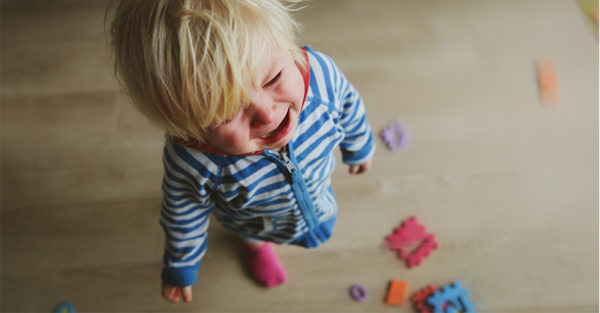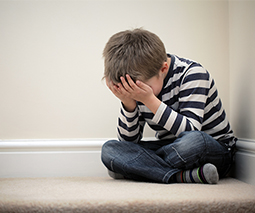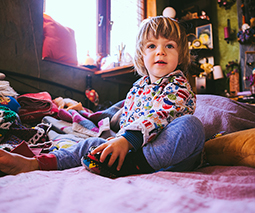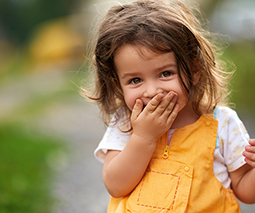‘Essential for development’: How to gently discipline your toddler

No one really wants to discipline their child, but as mothercraft nurse Chris Minogue explains, discipline is absolutely fine for toddlers and is also essential for their development.
How to discipline a toddler
Our gorgeous 21-month-old has a habit of upturning a bowl of porridge onto his head and then throwing it across the floor. It’s cute the first time. The tenth and eleventh time? Not so much.
Something had to be done.
When my husband suggested putting him in the cot for a few minutes, my tummy got that funny feeling when you’re not so sure.
Was that a bit harsh? He’s not even two, I thought to myself.
But then again, there was no way I wanted to be doing THIS every morning.
Feed Play Love Helpline’s mothercraft nurse Chris Minogue says discipline is not only okay for toddlers, but it’s also essential for their development.
That said, getting the right process can take a bit of thought.
NB: For this article, we’re defining a toddler’s age as anywhere between 14 months to three years old.
“As toddlers develop they’re looking for us to give them guidance, boundaries and support around their behaviour – be it in a social setting or in a family.
“If your toddler has been overstimulated or overtired, his behaviour will always be worse. He is looking to us to help regulate his behaviour because he can’t work it out himself.”
Read more about discipline:
- This is the best way to respond to a tantrum
- Why do kids lie, and when should parents be concerned?
- 7 REALLY annoying toddler behaviours that are actually pretty important
1. Pick your battles
“When you look at out-of-control behaviour, focus on the main thing you want to change, because you can’t pick all the battles all at once,” says Chris.
“You need to look at the day from the perspective of your child. If you pick up your child from daycare at 5pm and have a quick shop at Woolies, he will have a meltdown. You need to remember that it’s your responsibility to manage the activity of the day, based on where they are at.”
“Next decide what behaviours really hinder the normal of activity of a day. For example, when they refuse to get dressed the toddler can hold up the rest of the family from getting to work and school. Or maybe it’s screaming that you want to change. Whatever the biggest problem behaviour is for you, that’s the one to tackle first.”
2. Give them clear boundaries
Chris recommends dividing ‘problem’ behaviour into four areas:
- Behaviours you will ignore. Maybe little things like throwing his shoes on the ground or (my personal favourite), kicking his legs while you’re trying to change his nappy.
- Behaviours you remove/distract them from. These could include banging on the TV screen or reaching for a drawer with knives in it.
- Behaviours you will give a time-out. For example, when he is hurtful to another person, running away or having an utterly out-of-control tantrum, etc.
- Behaviours you withdraw them from. If he psychically attacks or pushes another child in the park, you just put him in the car and take him straight home. When disciplining in a park, it’s hard for a toddler to understand precisely what he has done wrong. But he will know if you remove him from the park. He will get that really quickly.
Deciding what behaviour you want to discipline, and which category that falls into is entirely up to you. For example, at our place, Lachie’s food-throwing antics are wearing thin, so we want to address it with discipline.

Chris advises:
“Firstly, look at this behaviour in the context of his day. When he throws the food, is it at dinner time? And if so, does that mean he’s been eating a lot during the day at daycare, so it’s reasonable that he might not be hungry? If that’s not the case and it’s reasonable that he should be hungry, give him one chance to display the behaviour you DO want. Show him what you want to do, and if he throws food again, then you end the meal. Take him out of the high chair and don’t offer any more food.”
3. Remember: We have to navigate for toddlers
Your toddler doesn’t know how to move through life’s experiences, yet. That’s where you come in.
“That’s why smacking doesn’t work,” says Chris, “Because smacking reinforces smacking. Where if you take the meal away from a toddler, or drive directly home from the park, he can see the impact of his behaviour and so, he can make a choice.”
“Also, don’t yell. You don’t have to yell for this to be effective. You just demonstrate the behaviour you want them to do, calmly.”
A note on discipline for older siblings
Chris does point out that you wouldn’t take the same approach for your older children. You can still give time outs etc. but the difference here is getting them to own their behaviour.
For example, say your older child hits your younger child. You send him to time out, then ask: “What did you do to make Mummy give you a time out? After his response, you say, “And how did it make your brother feel when you hit him?” And when he responds that it hurt. Then you can say, “That’s right it hurts to hit. I have spoken about this before, and you don’t seem to understand, so I am not going to read you a story tonight.”
This kind of conversation addresses the behaviour but also teaches your child empathy and responsibility for their actions which is appropriate for an older child.
Got your own trick when it comes to toddler discipline? Share it in the comments.
This post was originally published on Kinderling Kids Radio. Download the Kinderling app for more great stories.









